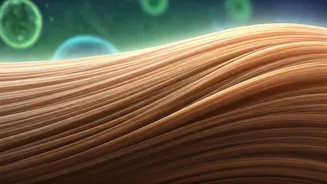Hair, Health Connection
The health of your hair often reflects your overall well-being. Several internal factors can significantly impact hair quality, including the function
of vital organs like the liver and kidneys. When these organs aren't working optimally, it can manifest in noticeable hair changes. This connection emphasizes the importance of viewing hair health as part of a larger health picture, where symptoms can indicate deeper issues requiring attention. Furthermore, it underlines how the appearance and texture of your hair can become significant indicators of internal imbalances, signaling the need for investigation and care.
Thinning or Hair Loss
Persistent hair thinning, particularly at the crown or temples, is a prominent sign that warrants attention. This type of hair loss can be linked to liver and kidney issues. Liver problems often disrupt the body's ability to process nutrients, which are essential for hair growth. Kidney issues, on the other hand, can lead to hormonal imbalances, further affecting hair follicles. Both scenarios starve the hair of vital components. It's crucial to acknowledge these changes. They aren't merely cosmetic; they are indicators of internal disruptions that require addressing the underlying cause for both hair and overall health improvements.
Oily, Greasy Scalp
An excessively oily scalp and greasy hair are additional indicators of potential internal imbalances. These conditions can stem from the liver's inability to regulate oil production effectively. When the liver is burdened, it can affect the body’s metabolic processes, including those that control the sebaceous glands. These glands then produce more sebum, resulting in an oily scalp and hair. This is in part due to poor detoxification, where excess sebum production may occur. Addressing liver health becomes critical to resolving this issue, promoting a balanced environment for hair follicles and thus improving hair's appearance and health.
Itchy, Inflamed Scalp
An itchy or inflamed scalp accompanied by hair fall is another crucial warning sign. This symptom can be a result of the body's inflammatory response, often linked to liver and kidney dysfunction. Kidney issues may cause toxins to accumulate in the bloodstream, leading to inflammation that affects the scalp. Liver problems can also contribute, as they may impair the body's ability to detoxify. Addressing the root causes of inflammation, often through dietary and lifestyle changes that support these vital organs, is an important step to restoring scalp health and improving hair retention. Careful attention and a focused approach can help alleviate discomfort and promote a healthier scalp.
Dry, Brittle Strands
Dry, brittle strands with split ends are often associated with liver and kidney troubles. Healthy hair requires proper hydration and nutrient absorption. If the liver or kidneys aren't functioning well, the body's ability to effectively deliver vital nutrients to hair follicles diminishes. This lack of nourishment leads to dryness, making hair susceptible to breakage and split ends. Improving liver and kidney function through appropriate dietary modifications, hydration, and possibly supplements can help restore hair's natural moisture balance. These strategies support nutrient delivery and improve hair health from the inside out.
Premature Greying
Premature greying is a sign of an energy imbalance that can result from issues in liver and kidney health. The natural pigment of hair depends on the body's ability to effectively synthesize nutrients and manage stress. When these processes are compromised, the hair may lose its color prematurely. Addressing the underlying conditions through a holistic approach is critical. This includes optimizing nutrient intake, managing stress levels, and ensuring that the liver and kidneys are functioning at their best. Such interventions can contribute to improved hair health and, in some cases, slow down the greying process.











